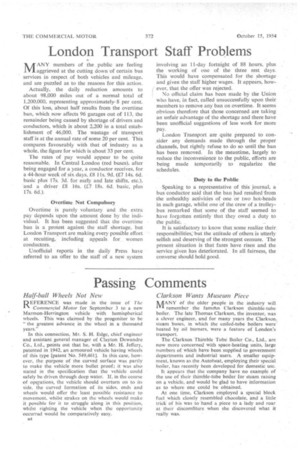London Transport Staff Problems
Page 38

If you've noticed an error in this article please click here to report it so we can fix it.
MANY members of the . public are feeling aggrieved at the cutting down of certain bus services in respect of both vehicles and mileage, and are puzzled as to the reasons for this action.
Actually, the daily reduction amounts to about 98,000 miles out of a normal total of 1,200,000, representing approximately. 8 per cent. Of this loss, about half results from the overtime ban, which now affects 96 garages out of 113, the remainder being caused by shortage of drivers and conductors, which is about 2,200 in a total establishment of 46,000. The wastage of transport staff is at the annual rate of some 20 per cent. This compares favourably with that of industry as a whole, the figure for which is about 33 per cent.
The rates of pay would appear to be quite reasonable. In Central London (red buses), after being engaged for a year, a conductor receives, for a 44-hour week of six days, £8 I Is. 9d. (£.7 14s. 6d. basic plus 17s. 3d: for early and late shifts, etc.), and a driver. £8 16s. (£.7 18s. 6d. basic, plus 17s. 6d.).
Overtime Not Compulsory Overtime is purely voluntary and the extra pay depends upon the amount done by the individual. It has been suggested that the overtime ban is a protest against the staff shortage, but London Transport are making every possible effort at recuiting, including appeals for women conductors.
Unofficial reports in the daily Press have referred to an offer to the staff of a neW system
involving an 11-day fortnight of 88 hours, plus the working of one of the three rest days. This would have compensated for the shortage and given the staff higher wages. It appears, however, that the offer was rejected.
No official claim has been made by the Union who have, in fact, called unsuccessfully upon their members to remove any ban on overtime. It seems obvious therefore that those concerned are taking an unfair advantage of the shortage and there have been unofficial suggestions of less work for more pay.
London Transport are quite prepared to consider any demands made through the proper channels, but rightly refuse to do so until the ban has been removed. In the meantime, largely to reduce the inconvenience to the public, efforts are being made temporarily to regularize the schedules.
Duty to the Public Speaking to a representative of this journal, a bus conductor said that the ban had resulted from the unhealthy activities of one or two hot-heads in each garage, whilst one of the crew of a trolleybus remarked that some of the staff seemed to have forgotten entirely that they owed a duty to the public.
It is satisfactory to know that some realize their responsibilities,`but the attitude of others is utterly selfish and deserving of the strongest censure. The present situation is that fares have risen and the service given has deteriorated. In all fairness, the converse should hold good.




































































































